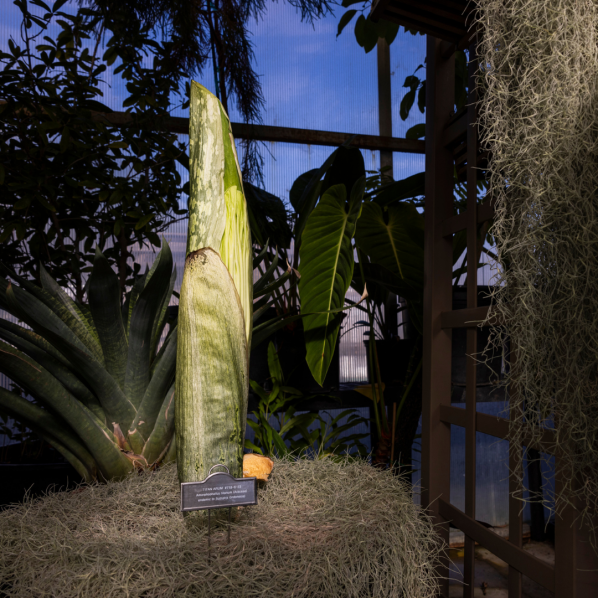BOONE, N.C. — Appalachian State University's Titan Arum, or "corpse flower," is expected to bloom next week at the Department of Biology's Greenhouse. The bloom will be the plant's first since it arrived in Boone over a decade ago.
Native to the Indonesian island of Sumatra, the Titan Arum, formally Amorphophallus titanum, is the world’s largest unbranched inflorescence, a floral structure composed of many smaller flowers. Commonly referred to as a "corpse flower," a blooming Titan Arum emits a powerful stench that attracts pollinators like flies and carrion beetles. The blooming is an exciting event because most corpse flowers require seven to ten years to produce their first blooms. Once the Titan Arum reaches maturity, it has an unpredictable blooming cycle, typically blooming once every few years. The average bloom lasts only two to three days with the peak growth—and odor—occurring at night into early morning.
In 2018, the International Union for Conservation of Nature listed the Titan Arum as endangered, estimating that only 1,000 plants remain in the wild due to the destruction of native forest habitat. Given their rare status and infamous aroma, the corpse flower is a popular attraction at many conservatories across the United States, including those at North Carolina State University in Raleigh and the University of North Carolina at Charlotte.
App State's corpse flower is named "Mongo" after Jerry Meyer, who has served as the Greenhouse manager for 14 years. In high school, Meyer's band director nicknamed Meyer "Mongo Jerry" after the 1970s British rock group Mungo Jerry, and the nickname stuck. A veteran of both the U.S. Air Force and Marines, Meyer brings strict discipline, tight organization, and a healthy passion for plants to his role in the Greenhouse's conservatory.
Mongo came to App State in 2011 as a generous gift from the Atlanta Botanical Garden, through a connection with one of the Greenhouse's longtime community volunteers, Chad Wunderlich. The plant arrived as a fist-sized corm—a swollen underground stem resembling a potato—in 2011 and has grown to weigh 30 pounds with a diameter of 18 inches.
On November 3, Wunderlich and Meyer noticed the outer covering of the plant, called the spathe, beginning to unfurl and alerted the Department of Biology. When asked about when the bloom can be expected, Meyer responded, "At the moment, I'm thinking Tuesday-Thursday of next week, but it's a first for us too."
The Department of Biology's Greenhouse houses over 1,400 species from around the world, and Mongo is just one of over 100 species in the facility's collection that are considered threatened in their natural habitats. Mongo will be moved to the new Conservation for Biodiversity Education and Research at App State's Innovation District upon completion, anticipated in 2025.
During the bloom, Greenhouse staff will share updates—including hours when visitors can see Mongo—on the Greenhouse Facebook and Instagram accounts. The Greenhouse is located at 211 Dale Street, across from the State Farm Parking Lot.
Additionally, check out the livestream below.
###
About the Department of Biology
The Department of Biology is a community of teacher-scholars, with faculty representing the full breadth of biological specializations — from molecular genetics to landscape/ecosystem ecology. The department seeks to produce graduates with sound scientific knowledge, the skills to create new knowledge, and the excitement and appreciation of scientific discovery. Learn more at https://biology.appstate.edu.
About the College of Arts and Sciences
The College of Arts and Sciences (CAS) at Appalachian State University is home to 17 academic departments, two centers and one residential college. These units span the humanities and the social, mathematical and natural sciences. CAS aims to develop a distinctive identity built upon our university's strengths, traditions and unique location. The college’s values lie not only in service to the university and local community, but through inspiring, training, educating and sustaining the development of its students as global citizens. More than 6,400 student majors are enrolled in the college. As the college is also largely responsible for implementing App State’s general education curriculum, it is heavily involved in the education of all students at the university, including those pursuing majors in other colleges. Learn more at https://cas.appstate.edu.
By Lauren Andersen
November 10, 2023
BOONE, N.C.

